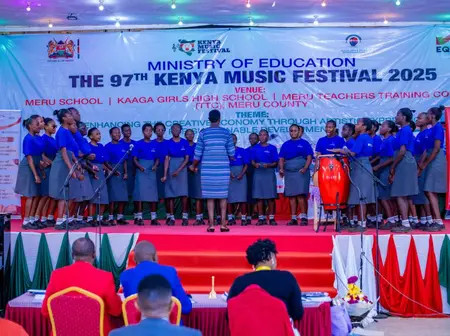Dr. Beatrice Inyangala, the Principal Secretary for Higher Education, has reiterated the government’s commitment to making higher education more accessible through a landmark reduction in university fees.
PS Inyangala argued that the reduction stemmed from the government listening to its youth and further highlighted that this crucial policy change directly responds to concerns raised by young people themselves during consultations and through the National Working Committee established by President William Ruto in September last year.
“No student, no parent, from the least privileged up to the most privileged, will pay more than Ksh75,000 a term, with fees ranging from Ksh6,000 to Ksh75,000, averaging Ksh30,000. We want to work with you, your families, and our students to nurture their talents, and this shows that the government cares,” she stated while speaking at Meru School.
This move, she explained, is a core part of the refined higher education funding model, which places and funds students according to their level of need, ensuring that those from less privileged backgrounds receive more support through scholarships and loans.
The PS also celebrated the 97th National Music Festival itself as a vibrant testament to the power of artistic expression and a crucial component of the nation’s development. She noted the remarkable growth in university participation in the festival, an event often dominated by high schools.
“Last year, only seven universities joined the festival. Today, please join me in applauding the more than 22 universities.” This significant increase, she noted, is “living proof that the arts are moving from the sidelines into the heart of higher education.”
She further emphasised that the creative economy is now one of Kenya’s fastest-growing frontiers, with music at its core, and articulated the government’s vision to empower young people to transform their artistic talents into sustainable livelihoods.
“If we equip you very well… with the right skills and networks, you will not only seek jobs, but you will be job creators,” she affirmed, linking this directly to the Bottom-Up Economic Transformation Agenda.
PS Inyangala also connected the festival’s vibrant spirit to the nation’s educational framework, specifically the Competency-Based Education (CBE) system, stating that it inherently offers a pathway for creativity, encouraging learners from their earliest years to identify and cultivate their talents across diverse artistic disciplines.
This foundational approach, she emphasised, is crucial for preparing students for successful careers within the dynamic creative industries. According to the PS, it is incumbent upon higher education institutions to seize this inherent potential within CBE, transforming it into a comprehensive educational experience that equips students with both the creative prowess and the entrepreneurial acumen essential for flourishing in the 21st-century economy.
The success of the Kenya Music Festival, PS Inyangala also noted, is a testament to strong partnerships. She extended gratitude to all partners present, recognising the vital contributions of the Ford Arts and Social Development Fund, Jubilee Insurance, and Equity Bank, among others. “The partnerships between universities, county governments, the private sector, and development partners are the rhythm that keeps this movement alive,” she stated, calling for a round of applause for their support.
She also awarded trophies and monetary prizes to the winners of an Equity-sponsored insurance class, which directly aligns with the festival’s theme: ‘Enhancing the Creative Economy through Artistic Expression for Sustainable Development.’ The top performers were Sacred Heart Mukumu Girls, who secured Ksh100,000 for first place, followed by State House Girls in second place with Ksh50,000, and Makueni Girls in third place, receiving Ksh30,000.
Speaking at the PS’s visit, Professor Frederick Ngala, Chairman of the Kenya Music Festival, also highlighted the global significance of this year’s music festival, saying, “The Kenya Music Festival is actually the largest music extravaganza south of the Sahara, north of Limpopo… actually, the whole globe.” He added that the festival has so far showcased 60% African content, which is vital for monetisation, as it focuses on artefacts and intellectual properties that are largely associated with culture and traditions on the continent.

Leave a Reply